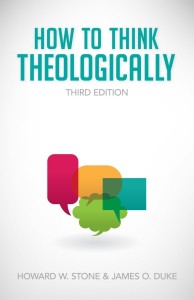 A review of How to Think Theologically by Howard W. Stone and James O. Duke. Published by Fortress.
A review of How to Think Theologically by Howard W. Stone and James O. Duke. Published by Fortress.
Since theology is thinking about God, ‘thinking theologically’ is something of a tautology, like ‘playing playfully’. Yet for some churchgoers, ‘thinking theologically’ is an oxymoron, like ‘fighting peacefully’, because, for them, faith is about feeling, and it is when we think too much about theology – when we get too academic and analytical – that we let in the demon of doubt.
However, any churchgoer does theology to some degree. In this sense theologians are like sportspeople, who can be amateur or professional, and unlike doctors, who can’t practice if they are merely amateurs. However we don’t always have the right tools. The authors of How to Think Theologically suggest theology can be “skimpy” or “piecemeal” if we haven’t considered it properly. We always work with an underlying theology, whether we think about it or not. The authors call this “embedded theology”.
But without taking the time to step back and analyse, we may be making assumptions that are out of kilter or too much informed by worldly philosophies. The temptation is to believe in a god of our own making – not God, but a god who conforms to our (or our society’s) way of thinking. We might be simply tacking ‘Jesus’ onto any old philosophy. (A prime example is prosperity gospel theology, where the idea that wealth is good is simply ‘Christianised’.) This goes for atheists too, who also do theology, if only to, in their view, prove the absurdity of something that doesn’t exist.
Theologian Helmut Thielicke wrote a great book entitled A Little Exercise for Young Theologians, (which, unlike How to Think Theologically, goes for prompts rather than thoroughness) in which he says, unexpectedly, that the scepticism of some laypeople towards theology is often justified. In this case, he points to examples of a little learning being a dangerous thing. Theological learning, especially in a formal sense, can make the beginning theologian feel aloof, because they know so much more than the (presumably ignorant) regular churchgoer. The challenge for theology is to not stand apart in criticism, but to better inform and better explain everyday experience. Theology can’t do that if it sounds like an irrelevant academic exercise.
We don’t necessarily criticise the existence of highly technical academic language in medicine but would be annoyed if a visit to the local GP only produced opaque jargon. Theology needs to provide answers in an everyday situation (which is why practical examples of how theologies play out are scattered throughout How to Think Theologically). Some theologians start the process of theology with God (a prime example being the theology of Karl Barth), but the need to be practical means some theologians insist on starting with issues. For the authors of this book, theology means thinking primarily about how the gospel affects everyday lives. This is something Martin Luther emphasised, and can be seen again and again in his catechisms: the need for theological reflection and the need to put our theology into practice.
This process of deliberation can be difficult. One need only look at debate over women priests or sexuality in some churches to see how it is not always clear how Christian theology will inform decisions. In this case, there are competing theologies, and they involve issues of what holds priority in reading the Bible, how God reveals his will to us, to what extent context informs theology, if and how theology changes over time, and so on.
Theologian Daniel Migliore suggests that faith and inquiry are “inseparable”. When we have faith it is a natural thing to want to understand it more. For the authors of How to Think Theologically, we need to spend some time on “deliberative” theology so that our embedded theology is a well-rounded and well-grounded one.
Nick Mattiske blogs about books at Coburg Review of Books
Email This Story
Why not send this to a friend?
